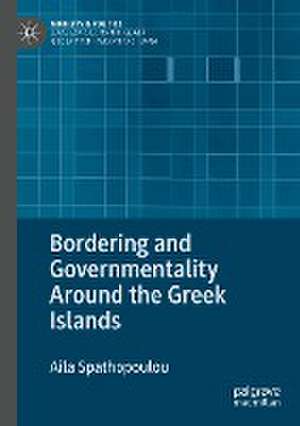Bordering and Governmentality Around the Greek Islands: Mobility & Politics
Autor Aila Spathopoulouen Limba Engleză Paperback – 3 ian 2024
| Toate formatele și edițiile | Preț | Express |
|---|---|---|
| Paperback (1) | 722.26 lei 6-8 săpt. | |
| Springer International Publishing – 3 ian 2024 | 722.26 lei 6-8 săpt. | |
| Hardback (1) | 727.31 lei 6-8 săpt. | |
| Springer International Publishing – 2 ian 2023 | 727.31 lei 6-8 săpt. |
Din seria Mobility & Politics
-
 Preț: 383.12 lei
Preț: 383.12 lei -
 Preț: 385.25 lei
Preț: 385.25 lei -
 Preț: 451.65 lei
Preț: 451.65 lei -
 Preț: 450.11 lei
Preț: 450.11 lei -
 Preț: 385.62 lei
Preț: 385.62 lei -
 Preț: 416.92 lei
Preț: 416.92 lei -
 Preț: 419.06 lei
Preț: 419.06 lei -
 Preț: 384.86 lei
Preț: 384.86 lei -
 Preț: 415.18 lei
Preț: 415.18 lei -
 Preț: 384.48 lei
Preț: 384.48 lei -
 Preț: 415.77 lei
Preț: 415.77 lei - 15%
 Preț: 469.41 lei
Preț: 469.41 lei -
 Preț: 385.47 lei
Preț: 385.47 lei -
 Preț: 382.95 lei
Preț: 382.95 lei -
 Preț: 418.07 lei
Preț: 418.07 lei -
 Preț: 422.70 lei
Preț: 422.70 lei -
 Preț: 418.67 lei
Preț: 418.67 lei -
 Preț: 391.61 lei
Preț: 391.61 lei -
 Preț: 385.84 lei
Preț: 385.84 lei -
 Preț: 446.47 lei
Preț: 446.47 lei -
 Preț: 476.95 lei
Preț: 476.95 lei -
 Preț: 376.22 lei
Preț: 376.22 lei - 18%
 Preț: 890.37 lei
Preț: 890.37 lei -
 Preț: 379.30 lei
Preț: 379.30 lei -
 Preț: 482.56 lei
Preț: 482.56 lei -
 Preț: 385.84 lei
Preț: 385.84 lei -
 Preț: 384.09 lei
Preț: 384.09 lei -
 Preț: 320.95 lei
Preț: 320.95 lei - 15%
 Preț: 695.34 lei
Preț: 695.34 lei -
 Preț: 319.21 lei
Preț: 319.21 lei - 15%
 Preț: 639.73 lei
Preț: 639.73 lei -
 Preț: 325.36 lei
Preț: 325.36 lei - 18%
 Preț: 782.57 lei
Preț: 782.57 lei -
 Preț: 383.33 lei
Preț: 383.33 lei -
 Preț: 416.92 lei
Preț: 416.92 lei -

-

-

Preț: 722.26 lei
Preț vechi: 880.81 lei
-18% Nou
Puncte Express: 1083
Preț estimativ în valută:
138.25€ • 150.22$ • 116.20£
138.25€ • 150.22$ • 116.20£
Carte tipărită la comandă
Livrare economică 21 aprilie-05 mai
Preluare comenzi: 021 569.72.76
Specificații
ISBN-13: 9783031085918
ISBN-10: 3031085914
Pagini: 230
Ilustrații: V, 230 p. 1 illus.
Dimensiuni: 148 x 210 mm
Greutate: 0.29 kg
Ediția:1st ed. 2022
Editura: Springer International Publishing
Colecția Palgrave Macmillan
Seria Mobility & Politics
Locul publicării:Cham, Switzerland
ISBN-10: 3031085914
Pagini: 230
Ilustrații: V, 230 p. 1 illus.
Dimensiuni: 148 x 210 mm
Greutate: 0.29 kg
Ediția:1st ed. 2022
Editura: Springer International Publishing
Colecția Palgrave Macmillan
Seria Mobility & Politics
Locul publicării:Cham, Switzerland
Cuprins
1. Introduction.- 2. From the scene of arrival onto the road: The ‘(mixed) flow’.- 3. From the Olive Grove onto the ferry: The ‘refugee volunteer’.- 4. From the relocation to the vulnerability route: The ‘deserving refugee’.- 5. From ‘self- detention’ to ‘self-deportation’: The underserving ‘economic migrant’.- 6. From humanitarian-bordering work to ‘incomplete’ translation: The ‘cultural mediator’.- 7. From to ‘integration’ to closed hotspots: The ‘migrant’.- 8. Conclusion.
Notă biografică
Aila Spathopoulou is Assistant Professor (Research) in the Department of Geography at Durham University, UK. She is also co-coordinator of the Research Area ‘Mobility: Migration and Borders’ at the Feminist Autonomous Centre for Research (Athens). She holds a PhD in Geography from King's College London and has published her research in peer reviewed journals.
Textul de pe ultima copertă
This book focuses on processes of bordering and governmentality around the Greek border islands from the declaration of a ‘refugee crisis’ in the summer of 2015 up until the emergence of the Covid-19 pandemic in 2020. The chapters trace the implementation of the EU migration hotspot approach across space and time, from the maritime Aegean border to the islands (Lesvos and Samos) and from the islands to the Greek mainland. They do so through the lenses of peoples’ refusal to succumb to categories that get reified as identities through the hotspot approach, such as that of the ‘deserving refugee’, the ‘undeserving economic migrant’, the ‘translator’, the ‘volunteer’, the ‘tourist’ and the ‘researcher’. This book explores how ‘migration management’ in Greece from 2015-2020, along with the reshaping of space and time, reconfigured peoples’ relationships with one another and ultimately with one’s self.
Aila Spathopoulou is Assistant Professor (Research) in theDepartment of Geography at Durham University, UK. She is also co-coordinator of the Research Area ‘Mobility: Migration and Borders’ at the Feminist Autonomous Centre for Research (Athens). She holds a PhD in Geography from King's College London and has published her research in peer reviewed journals.
Caracteristici
Shows that the hotspot is not a static institutional space confined to the Reception and Identification Centres Focuses on how the ‘hotspot’ is encountered through the resistance of the people whom it targets Engages in a critical and empirical analysis of movement in order to understand how time becomes violent
